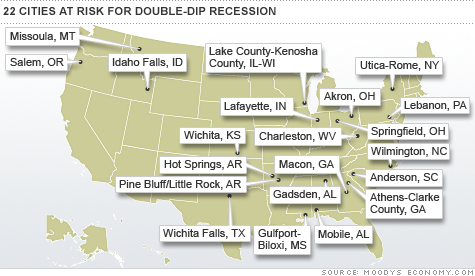 NEW YORK (CNNMoney.com) -- The chance of a national double-dip recession is hotly debated amid an increasing number of signs that the economic recovery is losing pace, but the risk is particularly troublesome on a local level.
NEW YORK (CNNMoney.com) -- The chance of a national double-dip recession is hotly debated amid an increasing number of signs that the economic recovery is losing pace, but the risk is particularly troublesome on a local level.A new report from Moody's Economy.com singled out 22 cities that are at risk of slipping back into a recession in as early as three months. To come to this conclusion, the economists considered dwindling progress in employment, housing starts, home prices and industrial production. (See the map above for the full list.)
The at-risk cities are spread across the country, though more than half of the cities are in the South, and five are concentrated in the Midwest.
"With chances of a national double-dip recession now estimated at about one in four, several metro areas will probably experience their own downturns in the first half of 2011," said economist Andrew Gledhill, author of the report.
Private sector hiring has been tapering off in recent months compared to the start of the year, triggering Moody's to boost its forecast for a national double-dip from a 20% chance to 25% chance.
What's a double dip? No one really knows.
In the 22 identified metro areas, Gledhill said private sector hiring is particularly sluggish, increasing the chances of a slowdown.
Without a substantial pick-up in hiring, Gledhill said the number of cities in danger of a double-dip recession could grow, possibly reaching the triple-digits.
"There was a time when all 384 metro areas were in a recession. We probably won't get to that point again, but given the growing risk of another national recession, we're on the lookout for more metro areas that will be weakening substantially on several levels over the next six months to a year," Gledhill said.
He added that a handful of metro areas, particularly those that are industrial economies, are also suffering from a recent falloff in manufacturing.
By Hibah Yousuf CNNMoney.com August 18, 2010: 10:39 AM ET
22 cities in danger of a double-dip recession - Aug. 17, 2010

